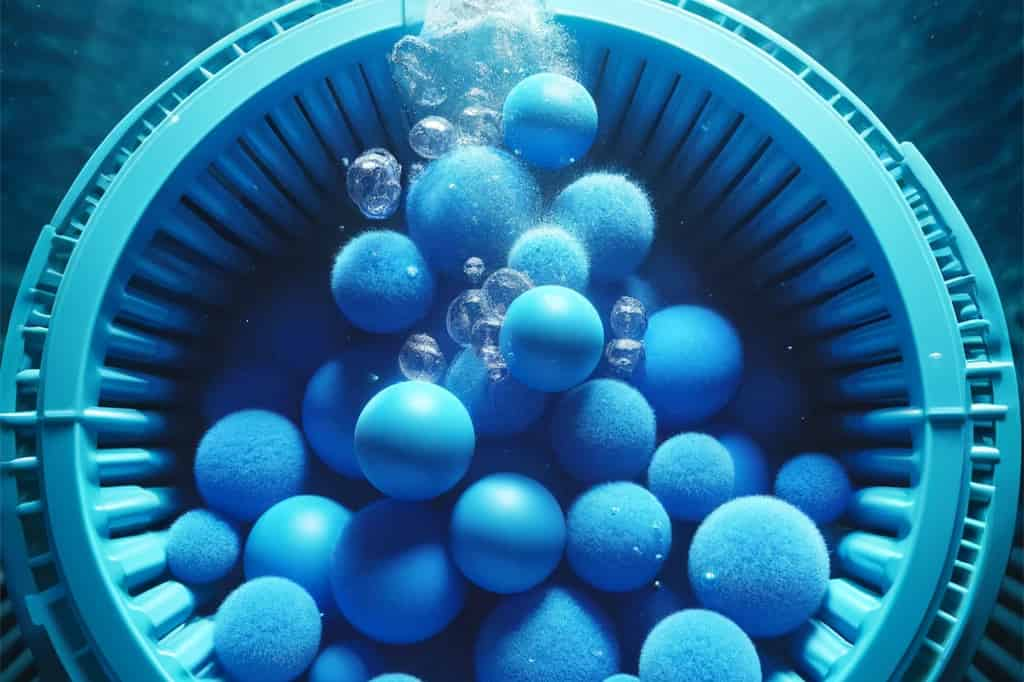Maintaining a clean and crystal-clear pool requires effective filtration, and pool filter balls have become an increasingly popular choice among pool owners. These innovative filtration media offer a lightweight, eco-friendly alternative to traditional sand, making them a preferred option for many. However, one of the most common questions that pool owners have is, “How long do pool filter balls last?” Understanding the lifespan of these filtration balls, how to care for them, and when to replace them is crucial for keeping your pool in top condition.

What Are Pool Filter Balls?
Pool filter balls are small, spherical filtration media typically made from polyester, polyethylene, or a combination of synthetic fibers. Unlike traditional sand filters that rely on granular sand to trap debris, filter balls use a unique structure that allows them to capture even finer particles. This results in cleaner water and more efficient filtration.
One of the standout features of pool filter balls is their lightweight nature, which makes them easy to handle and install. They also require less frequent backwashing compared to sand, saving water and reducing the overall maintenance effort.
Lifespan of Pool Filter Balls
The lifespan of pool filter balls can vary based on several factors, including the quality of the balls, pool usage, and maintenance practices. On average, high-quality pool filter balls can last between two to five years, making them a durable and cost-effective option for pool filtration.
1. Quality of Filter Balls
The durability of pool filter balls largely depends on the quality of the product. High-quality filter balls, such as blue pool filter balls, are designed to withstand the rigors of filtration over extended periods. These premium filter balls retain their shape and filtration capabilities even after repeated cleaning and backwashing. Investing in a reputable brand of filter balls can significantly extend their lifespan and ensure consistent pool water quality.
2. Pool Usage
The frequency and intensity of pool usage play a significant role in determining how long pool filter balls will last. Pools that are used frequently or host large numbers of swimmers may experience faster wear on their filtration media due to the increased load of contaminants. In such cases, the filter balls will need to work harder to maintain clean water, potentially reducing their overall lifespan.
Conversely, pools that are used less frequently or have fewer swimmers will put less strain on the filter balls, allowing them to last longer. Regular maintenance and proper pool care can also help extend the life of your filter balls, regardless of usage frequency.
3. Maintenance Practices
Proper maintenance is key to maximizing the lifespan of pool filter balls. Unlike sand filters, which require frequent backwashing to remove trapped debris, filter balls need less frequent cleaning. However, it’s still important to regularly check and clean the filter balls to prevent clogging and maintain optimal filtration efficiency.
Over time, debris, oils, and other contaminants can accumulate on the filter balls, reducing their effectiveness. To clean the filter balls, simply remove them from the filter, rinse them thoroughly with clean water, and allow them to dry before reinstalling them. Some pool owners also choose to soak their filter balls in a mild detergent solution to break down oils and other stubborn contaminants.
Signs That It’s Time to Replace Your Pool Filter Balls
Even with proper maintenance, pool filter balls will eventually need to be replaced. Here are some signs that it might be time to swap out your old filter balls for new ones:
1.Decreased Filtration Efficiency:
If you notice that your pool water is not as clear as it used to be, or if the filter seems to be struggling to keep up with debris, it may be a sign that the filter balls are becoming worn out and less effective.
2.Flattened or Misshapen Balls:
Over time, pool filter balls can become compressed or misshapen, which reduces their ability to trap debris effectively. If the filter balls no longer have their original spherical shape, it’s time to replace them.
3.Increased Frequency of Cleaning:
If you find yourself needing to clean the filter balls more frequently to maintain good water quality, this could indicate that they are nearing the end of their useful life.
4.Clogging or Reduced Water Flow:
If your pool’s water flow seems restricted or the filter is clogging more often than usual, it might be time to inspect and replace the filter balls.
The Role of Blue Pool Filter Balls
Among the various types of filter balls available, blue pool filter balls have gained popularity due to their durability and superior filtration performance. These balls are specifically designed to provide enhanced filtration, capturing even the smallest particles and ensuring that your pool water remains crystal clear. Their distinct blue color also makes them easy to distinguish from other types of filter balls, helping pool owners keep track of their maintenance schedule.
Conclusion
Pool filter balls are a reliable and efficient option for maintaining clean and clear pool water. With a potential lifespan of two to five years, they offer a long-lasting solution that requires less frequent maintenance compared to traditional sand filters. By investing in high-quality filter balls, such as blue pool filter balls, and following proper maintenance practices, you can maximize their lifespan and enjoy a pristine pool environment for years to come.
Regularly inspecting your filter balls for signs of wear and replacing them when necessary will ensure that your pool filtration system continues to perform at its best. Whether you’re a seasoned pool owner or new to pool maintenance, pool filter balls provide an effective, eco-friendly, and cost-efficient way to keep your pool in top condition.
